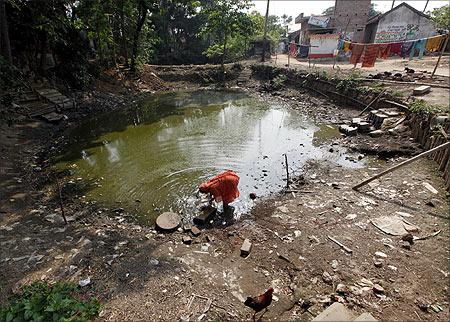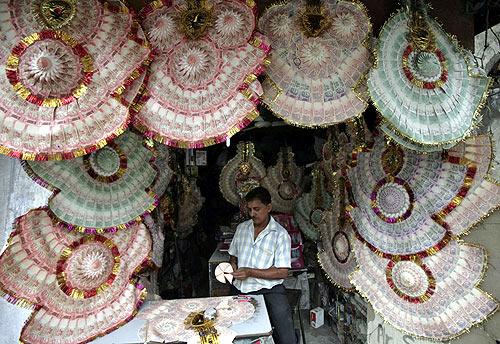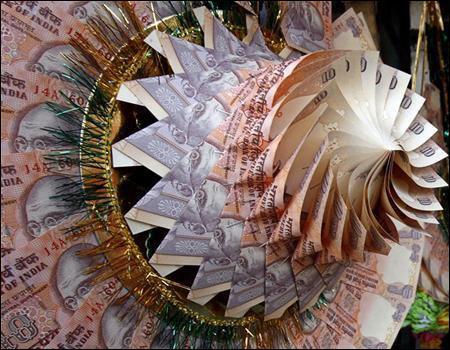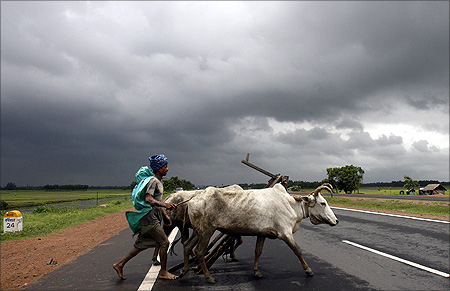 | « Back to article | Print this article |
Can the Centre solve states' debt crises?
West Bengal's demand for a moratorium on repayments to the Centre raises a whole slew of problems
West Bengal is not begging, it's only raising a justified demand, insisted state Chief Minister Mamata Banerjee a few days ago.
She was explaining the rationale behind the state government's demand from the Centre that a moratorium be declared on West Bengal's interest and repayments, of about Rs 22,000 crore annually, for the next three years.
The Centre, on the other hand, has maintained for some time that the demand is not tenable.
However, Banerjee's warning on the moratorium, at a time when former Finance Minister Pranab Mukherjee needed the support of the Trinamool Congress for his candidature for the post of president, made the finance ministry run from pillar to post to find a solution to her demand.
Click NEXT to read more...
Can the Centre solve states' debt crises?
Bureaucrats dealing with the relevant issue were summoned to identify the problem and suggest options.
After West Bengal Finance Minister Amit Mitra met Mukherjee on June 11 to discuss a special package for the state, it was believed that something was being worked out.
"As and when we finalise it [it will be announced]," Mukherjee told reporters a day later, when asked what the government was doing with regard to West Bengal's demand. However, political developments fell out such that Banerjee's support was not essential. Naturally, no package was announced even till Mukherjee's last day in the finance ministry.
Click NEXT to read more...
Can the Centre solve states' debt crises?
While Banerjee has stressed that her demand had nothing to do with her decision on not supporting Mukherjee for president, some believe some form of relief could be given to the state later.
If at all the Centre announces a package for the state after Mukherjee becomes the next president of India, it is not likely to be a moratorium on its annual obligation of Rs 22,000 crore.
According to data available with the Reserve Bank of India (RBI), of an estimated total outstanding liability of Rs 2.1 lakh crore of the West Bengal government, the amount due to the Centre is only about Rs 12,780 crore, which is just six per cent of its total dues.
Click NEXT to read more...
Can the Centre solve states' debt crises?
A significant portion of the outstanding liability on which interest moratorium is sought comprises state development loans (Rs 81,170 crore or 38.3 per cent) and loans from the National Small Savings Fund (Rs 82,630 crore or 39 per cent).
The continued emphasis on market borrowings to finance the gross fiscal deficit of state governments is reflected in the shift in the composition of states' outstanding liabilities.
While the share of market loans in the outstanding liabilities of state governments has increased gradually, the share of loans and advances from the Centre declined sharply from 1999-2000 onwards, RBI said in a report.
Click NEXT to read more...
Can the Centre solve states' debt crises?
"West Bengal wants a moratorium on its market borrowings and NSSF. This is public money and it is not for the Centre to give a relief on that," said a finance ministry official.
This is just one part of the problem for the Centre. Another issue is whether it can take a decision on something that is primarily the Finance Commission's domain.
Though there are no laid-out rules and no provisions that bar the Centre from doing so in this regard, usually the Finance Commission recommends whether relief should be provided to a state or not. The 13th Finance Commission identified West Bengal, Kerala and Punjab as revenue deficit states in 2007 and gave them a slightly relaxed fiscal consolidation roadmap, but it did not suggest a moratorium.
Click NEXT to read more...
Can the Centre solve states' debt crises?
"The government technically can't intervene. It is the domain of the Finance Commission, but in some cases the government can take the decision if there is a justification for that. Special term loans were given for Punjab between 1995-1996 and 2006-07. Some of it was approved by the government and some by the Finance Commission. However, that was for militancy not for fiscal mismanagement," added the official.
Thus, the government can only provide relief only on the loan it had extended to the state; and that, too, in concurrence with the Finance Commission.
The matter may be referred to the 14th Finance Commission that will be constituted shortly.
Click NEXT to read more...
Can the Centre solve states' debt crises?
Alternatively, it can give some relief in the form of state- and scheme-specific grants approved by the Planning Commission. The issue here is that state governments want flexibility in spending and discourage funds that are tied to a particular project.
West Bengal also asked the Centre to restructure its debt in the meanwhile by eliminating a part of it and reducing interest rates and extending repayment tenure.
The dilemma of the Centre does not end here. If it gives relief to West Bengal, it will also have to extend similar benefits to Kerala and Punjab, which were clubbed in the same category by the Finance Commission. It fears such a move may also discourage states that efficiently managed their debt.
Click NEXT to read more...
Can the Centre solve states' debt crises?
Moreover, profligacy at this stage would put further pressure on the Centre's fiscal deficit. It will also have consequential effect on the state's debt-to-GDP ratio.
If the moratorium is given on loans given by the Centre, the tenure of the loan will increase. Thus, the moratorium will not be of much help unless the state increased its revenue and curtailed expenditure.
In a nutshell, if there is a political will, then the Centre can find some solution to the woes of West Bengal - but it will have to figure out how to do it best without disturbing the fiscal consolidation roadmap laid out for both the Centre and states.
In return, states that get relief will have to cut down on expenditure wherever possible








